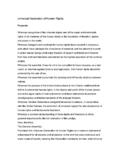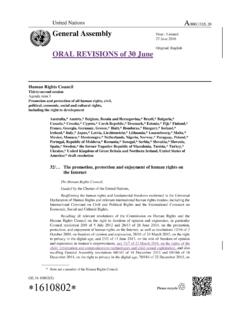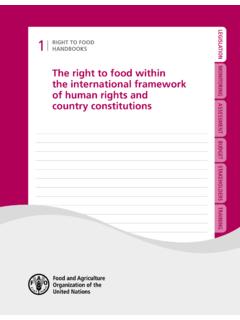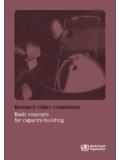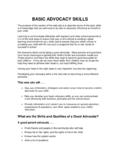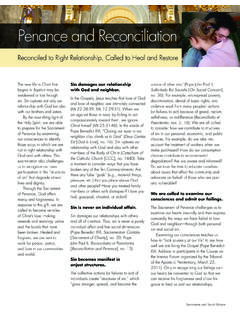Transcription of The Right to Vote: A Basic Human Right in Need of …
1 Box 5675, Berkeley, CA 94705 USA. The Right to Vote: A Basic Human Right in Need of Protection Contact Information: Alexander Tuzin, Frank C. Newman Intern Representing Human rights Advocates through University of San Francisco School of Law's International Human rights Clinic Professor Connie de la Vega Tel: 1-415-422-2296. THE Right TO VOTE. I. Introduction Human rights Advocates ( HRA ) seeks to ensure that the Right to vote is guaranteed to all citizens as mandated by international law. The Right to vote is a Basic Human Right that empowers citizens to influence governmental decision-making and to safeguard their other Human rights . Free and fair elections help to prevent war and bloodshed by allowing for peaceful transfers of power. By the same token, the derogation of voting rights may provoke violence and civil unrest. Despite consensus on the importance of the Right to vote, its inclusion in many international Human rights instruments, and its significance in protecting other Human rights , derogations of voting rights remain widespread.
2 This paper begins by outlining the legal basis of the Right to vote. Next, it examines derogations of the Right to universal and equal suffrage and derogations of the Right to vote through fraud and intimidation. Then, it explores election administration procedures, as well as the new challenges that electronic voting systems pose to the Right to vote. Finally, HRA offers recommendations and urges the Council to appoint a Special Rapporteur to investigate derogations of the Right to vote and to define meaningful parameters for commitments, principles, and best practices for protecting the Right to vote. Attached to this report is a proposed resolution for establishing such a mandate. II. Legal Basis The Right to vote and the Right to public participation in government is asserted in Article 21 of the Universal Declaration of Human rights ( UDHR ). It provides that: . HRA has submitted several reports to the Commission on Human rights and to the Human rights Council concerning the Right to vote.
3 The HRA report from 2007 on the Right to vote is available at http://daccess- 2. (1) Everyone has the Right to take part in the government of his country, directly or through freely chosen representatives. (2) Everyone has the Right of equal access to public service in his country. (3) The will of the people shall be the basis of the authority of government; this will shall be expressed in periodic and genuine elections which shall be by universal and equal suffrage and shall be held by secret vote or by equivalent free voting procedures. 1. Article 25 of the International Covenant on Civil and Political rights ( ICCPR ) codifies these rights , requiring that: Every citizen shall have the Right and the opportunity, without any of the distinctions mentioned in article 2 and without unreasonable restrictions: (a) To take part in the conduct of public affairs, directly or through freely chosen representatives;. (b) To vote and to be elected at genuine periodic elections which shall be by universal and equal suffrage and shall be held by secret ballot, guaranteeing the free expression of the will of the electors.
4 (c) To have access, on general terms of equality, to public service in his country. 2. Furthermore, the Right to vote is protected under several regional Human rights instruments, including Article 13 of the African Commission on Human and People's rights ( ACHPR ), Article 23 of the American Convention on Human rights ( ACHR ), and Protocol One of the European Convention on Human rights ( ECHR ). III. Universal and Equal Suffrage Article 25 of the ICCPR explicitly extends the Right to vote to every citizen, and calls for universal and equal suffrage. 3 To further define the Right to vote, the Human rights Committee adopted General Comment 25 to the ICCPR. It explains that, [a]rticle 25 of the Covenant recognizes and protects the Right of every citizen to take part in the conduct of public affairs, the Right to vote and to be elected and the Right to have access to public service. 4. Furthermore, General Comment 25 to the ICCPR emphasizes that "no distinctions are permitted 1.
5 Res. 217A(III), Doc. A/810 (1948) [hereinafter UDHR]. 2. Dec. 16, 1966, 999 171 [hereinafter ICCPR]. 3. Dec. 16, 1966, 999 171. 4. HRC General Comment 25, para. 1, Doc. CCPR/C/21 (1996). 3. between citizens in the enjoyment of these rights on the grounds of race, colour, sex, .. or other status." 5 Nevertheless, in some countries, certain citizens are denied their voting rights as a matter of law, based on a past criminal conviction, based on their gender, or based on their race or ethnicity. A. Disenfranchisement Based on Criminal Conviction Article 25 of the ICCPR requires that every citizen be given the Right to vote. General Comment 25 to the ICCPR clarifies that [i]f conviction for an offence is a basis for suspending the Right to vote, the period of such suspension should be proportionate to the offence and the sentence. 6. In the United States, many citizens are denied their voting rights because of a prior conviction. In Richardson v. Ramirez, the Supreme Court rejected a challenge to California's disenfranchisement of convicted prisoners, ruling that the American Constitution's 14th Amendment does not require states to provide a compelling reason before denying convicted individuals the Right to vote.
6 7 In fact, in some states, ex-offenders who have fully served their sentences remain barred from voting for the rest of their lives. 8 Such a restriction is excessive and disproportionate to the offense, and it undermines the Right to vote mandated by the ICCPR. In contrast, many countries have denounced such disenfranchisement and have explicitly recognized the importance of preserving their citizens' voting rights after a conviction. The 5. HRC General Comment 25, para. 3, Doc. CCPR/C/21 (1996). 6. Paragraph 14 of the Human rights Committee's General Comment 25 provides that restriction on the Right should be proportionate to the offense and sentence. HRC Gen. Comment 25, doc. CCPR/C/21 (1996). 7. Richardson v. Ramirez, 418 24 (1974). 8. Marc Mauer and Tushar Kansal, Barred for Life: Voting rights Restoration in Permanent Disenfranchisement States, The Sentencing Project 1 (2005). 4. European Court of Human rights has found that the restriction of voting rights of all convicted prisoners violates Article 3 of Protocol No.
7 1 of the ECHR. 9. In this regard, South Africa should be commended for its efforts to facilitate and encourage convicted citizens to vote even while they are in prison. South Africa has maintained that the disenfranchisement of prisoners is a violation of South African law and international law, and that the State has a positive obligation to enable its prisoners to vote. 10 In August v. Electoral Commission, in 1999, the Constitutional Court confirmed that the unqualified Right for every citizen to vote imposes positive obligations upon the government to make reasonable arrangements for prisoners to vote. 11 Then, in 2004, in Minister of Home Affairs v. NICRO, the Constitutional Court reaffirmed its holding in August. It ruled that depriving the Right to vote from prisoners who are serving a sentence without the option of paying a fine instead is not acceptable without a compelling justification. 12 Efforts are currently being made to help prisoners to register and to exercise their Right to vote in the South African general elections that are scheduled to take place later this year.
8 13. B. Disenfranchisement Based on Gender Article 7 of the Convention on the Elimination of All Forms of Discrimination Against Women ( CEDAW ) protects the Right of women to vote on an equal basis with men. In particular, Article 7 of CEDAW provides that State Parties shall take all appropriate measures to eliminate discrimination against women in the political and public life of the country and, in 9. Hirst v. United Kingdom, no. 74025/01, ECHR (2005), available at 10. Minister of Home Affairs v. NICRO, 2004 (5) SA 1 (CC), available at 11. August v. Electoral Commission, 1999 (3) SA 1 (CC) ( ). 12. Minister of Home Affairs v. NICRO, 2004 (5) SA 1 (CC), available at 13. Civil Society Prison Reform Initiative. Prisoner Participation in the 2009 General Elections. Community Law Centre, University of the Western Cape, January 26, 2009. news/prisoner-participation-in-the-2009- general-elections 5. particular, shall ensure to women, on equal terms with men, the Right [t]o vote in all elections.
9 14 However, even in some countries that have ratified CEDAW, women face considerable obstacles to meaningful participation in elections as voters and as candidates. In 2005, Saudi Arabia conducted its first nationwide municipal elections. This was an extraordinary development in a State where all citizens, both men and women, had previously been denied the Right to vote. However, Saudi women were excluded from participating in this election. In 2000, Saudi Arabia had ratified CEDAW without reservations to Article 7, so by denying Saudi women the Right to vote, Saudi Arabia had failed to meet their international Human rights obligations. Furthermore, the exclusion of women voters violated Saudi electoral laws, which provided that all citizens were to be eligible to vote, and not just men. 15. At the time, the Saudi interior minister simply said, I do not think that women's participation is possible. 16 The Saudi election officials justified denying women's voting rights because of administrative difficulties.
10 These officials maintained that there were not enough women electoral staff to run women-only voter registration centers and that many Saudi women did not have the required photo identification cards. 17 Then again, the head of the Election Committee also indicated that, before they allowed women to exercise their Right to vote, they intended to conduct studies to assess whether [the women's vote] is useful or not. 18. 14. Convention on the Elimination of All Forms of Discrimination Against Women, Dec. 18, 1979, 1249 13. [hereinafter CEDAW]. 15. Saudi Arabia: Women's Exclusion from Elections Undermines Progress, Amnesty International, Nov. 17, 2004. 16. Saudi Women Barred From Voting, BBC NEWS, Oct. 11, 2004, 17. Saudi Women Barred From Voting, BBC NEWS, Oct. 11, 2004, 18. Saudi Arabia: Women's Exclusion from Elections Undermines Progress, Amnesty International, Nov. 17, 2004. 6. Nevertheless, Saudi authorities agreed to allow women to vote in the next municipal elections to be held in 2009.
